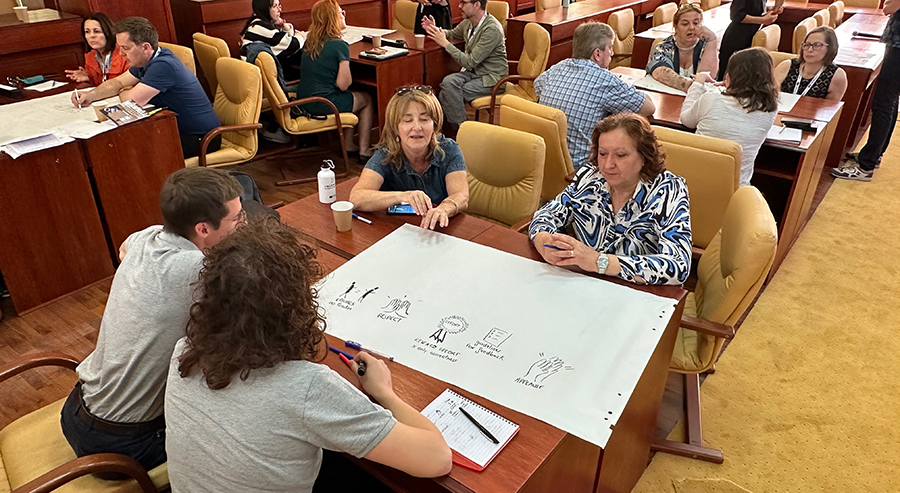To that end, the third cohort of the INGENIUM Staff Academy met in May 2024 at the Gheorghe Asachi Technical University of Iasi, Romania, to exchange different teaching methods and best practices.
Connecting with different educators from other disciplines and backgrounds is needed to develop as a teacher, as we might find novel practices to develop our teaching in the most unlikely of places.
Let’s explore the different pedagogical methods presented during the Staff Academy.
Opening Speech
Iulian Ciocoiu’s opening speech on the future of education within the INGENIUM European University raised several important points about the role of teachers and educators in the rapidly transforming landscape of generative AI education.
As educators, our professional development needs to be continuous so that we can adapt to the ever-evolving technological requirements of the job.
While it is quite easy to wax lyrical about AI’s potential to transform our profession, negatively impact our jobs, or be overly optimistic about its promise, it is a tool like any other. We should be both receptive and critical about adopting new tools and remember the benefit of the human factor in teaching and learning.
Team Based Learning Approach
David O Hanlon from Munster Technological University, Ireland, facilitated his workshop on an experiential introduction to Team-Based Learning (TBL).
The approach requires dividing a course or module into TBL units, which are then divided into six steps:
- Pre-class preparation
- individual and group tests
- a clarification session
- an application exercise
- and a whole class discussion.
He demonstrated how the approach can facilitate active learning and improve intercultural awareness, student engagement, and attendance. He encouraged us to consider adapting our own teaching into TBL units.
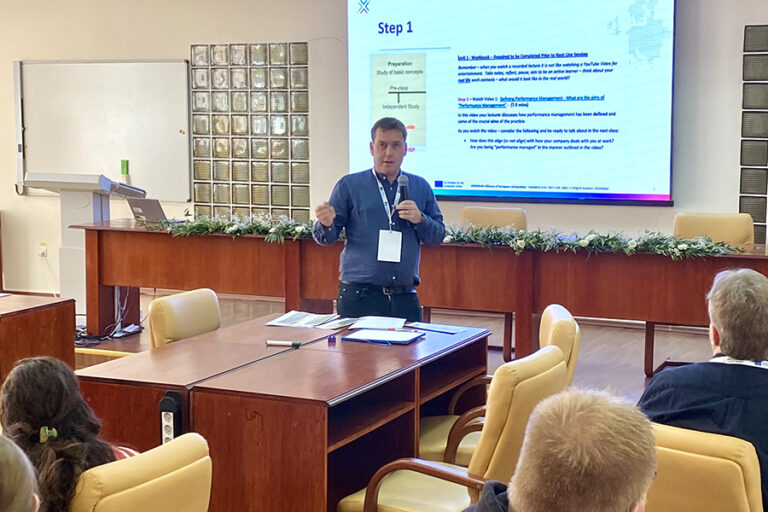
Online Collaborative Storytelling and Mind Mapping in Bilingual Education
Marta Escalonilla from the University of Oviedo led us through an engaging session on using podcasts and mindmaps in teaching to develop collaboration and language skills in economics.
We learned how to implement her teaching activities into our lessons and the potential benefit it has to improve the students’ participation, engagement and communication skills. Further, she explained how it can help deepen the bonds between students and reduce the pressure they might put on themselves to complete assignments.
Business Involvement-based learning
Antoniya Yanakieva from the Medical University of Sofia explained the benefits of business involvement in the master’s programme for clinical trial management.
In her session, she used Mentimeter to improve our engagement with her material, as she showed us how students on the programme learn about a variety of different things in clinical trials, from dealing with businesses to engaging with industry partners and research organisations.
This varied interaction and regular subject-specific teaching enable students to acquire strategic thinking and problem-solving skills needed for modern business life.
Digital Learning for Footwear Design and Engineering
Mariana Costea and her PhD students from the Gheorghe Asachi Technological University of Iasi gave a fascinating glimpse into how technology and digital tools can be used to teach footwear design and engineering. Many of these tools are transferrable into the teaching of other subjects, too.
They walked us through the shoegame.eu and showed us how serious games can be used as educational tools and increase your work’s impact and reach. We can all learn a lot from applying serious games in very different education and research fields.
Tell your story – Build your dream: Towards international work-life competences
Mikhail Nemilentsev and Riku Happonen from the South-Eastern Finland University of Applied Sciences brought a personal touch to the Staff Academy. They explored how their storytelling technique can break down barriers between people and facilitate better intercultural communication.
Their short technique has made it easier for international students in Finland to find work placements while at the same time developing their pitching and feedback skills. It is easily transferable to other settings, like team-building, and can serve as a good icebreaker for new student groups.
Dealing with threshold concepts: mistake driven learning
Nathanael Kuipers from the University of Skövde led a fantastic interactive workshop on how to support mistake-driven learning with threshold concepts. This unique approach encourages students to study the learning material independently and purposefully let them make mistakes to help facilitate their learning.
This is an increasingly important approach to student learning and sets them up with the necessary skills to fail in a safe environment. It also approaches learning differently and more organically.
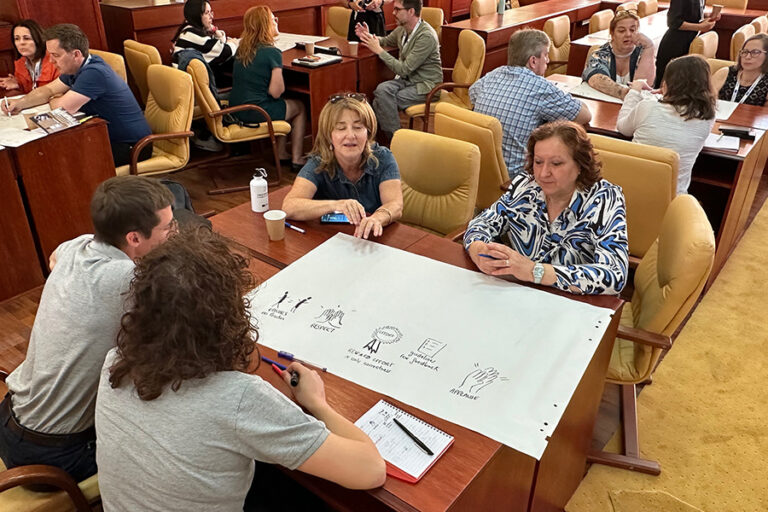
An Approach to Sustainability and Development 21st-century skills: a business English entrepreneurial simulation course
Kellie Bruchmueller from Karlsruhe University of Applied Sciences gave an engaging workshop on bringing aspects like creativity, problem-solving and critical thinking skills into a course on business English and entrepreneurship. She showed several examples of innovative video pitches her students had made.
Rather than focusing solely on language, Kellie’s approach to language was a novel one that also considered sustainability and digital skills. Good education crosses traditional disciplinary boundaries.
Simulation Center to train teaching and education professionals
Coline Laboulais and Samuel Hamon from the University of Rouen, Normandy, simulated a simulation! In their session, they demonstrated and involved us in an interactive simulation of a teaching simulation.
They set up a simulation room with dividers and a live feed, where we practised teaching different students, and the observers could follow our performance and make notes. Once you forget about the camera, you can teach much more naturally than if you had an actual observer in the classroom. This sort of feedback tool is essential to developing as an educator.
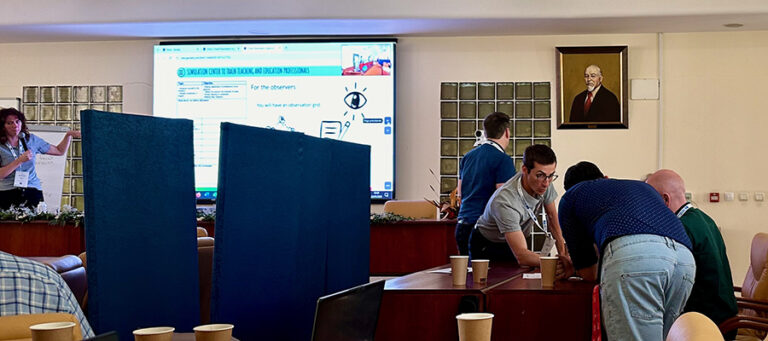
Applying Case Studies’ Teaching Techniques in Higher Education
Anastasia Pratikaki from the University of Crete unlocked our learning through the power of forms! She demonstrated how a case study can engage students in active learning and decision-making by simulating a real-life problem to solve.
She used a questionnaire to gauge our opinions on a moral issue, and then we discussed the answers. This is a particularly useful tool for fruitful class discussions and for developing argumentation and reflection skills as well.
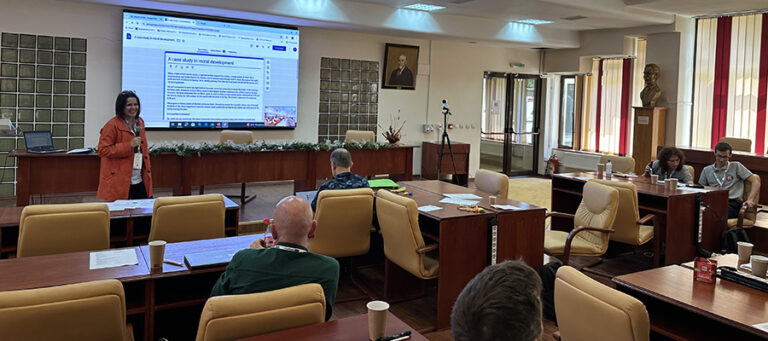
Revolutionizing Dental Education: The OMG System’s Real-Time Guidance
Bruna Sinjari & Gianmaria D’Addazio gave us a fascinating glimpse into the advances being made in dental education at the University “G.d’ANNUNZIO” Chieti-Pescara.
They showed how technology is being used to standardise different protocols in prosthodontics and implantology. Further, they used AI voice-over technology to enhance their video presentation. This was an exciting application of AI in a novel way.
Concluding remarks
Each of these Staff Academy sessions helps foster creativity and innovation within the European University INGENIUM as we strive to create a European-wide teacher community for the good of all.
The South-Eastern Finland University of Applied Sciences will host the next Staff Academy in February 2025.


